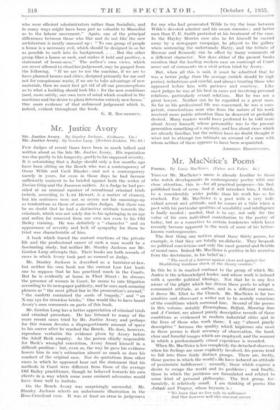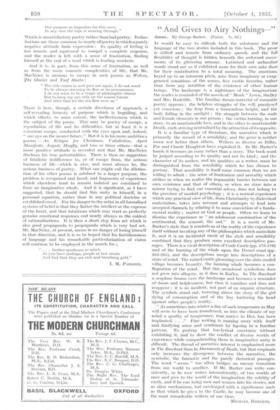Mr. MacNeice's Poems
Poems. By Louis Mac.Noice. (Faber and Faber. Cs.)
Tuoucu Mr. MacNeice's name is already familiar to those who watch developments in contemporary poetry with any close attention, this is—for all practical purposes—his' first published book of verse. And it will introduce him, I think, to a considerably wider public than his work has so far reached. For Mr. MacNeice is a poet with a very indi- vidual accent and attitude, and he comes at a time when a poet with his particular qualities of sensibility and intelligence is badly needed ; needed, that is to say, not only far the value of his own individual contribution to the poetry of today, but as a corrective to certain tendencies which have recently become apparent in the work of some of his better- known contemporaries.
The first thing one notices about these thirty poems, for example, is that they are totally un-didactic. They bespeak no political convictions and only the most general and flexible of moral ones. Indeed Mr. MacNeice is positive in his aversion from the doctrinaire, in his belief in :
" The need of a fortress against ideas and against:the' Shuddering insidious shock of the theory.vondors."
In this he is in marked contrast to the group of which Mr. Auden is the acknowledged leader, and whose work is imbued with a specific political ideology. Not that he is any less aware of the plight which has driven these Poets to 'adopt a communist attitude, as earliet; and in a different manner, it drove Mr. Eliot to the Church', Mr. MacNeice fat too sensitive and observant a writer not to be acutely conscious of the conditions which surround him. Several of the poems in this volume, notably Birmingham, Belfast, Morning Sun and A Contact, are almost purely descriptive records of these conditions as evidenced in modern industrial cities rind in the lives of those who work there. say `` almost pikely descriptive " because the quality which liripieSses one most in these poems is their accuracy of observation, the hard, clear and forceful images which are employed, and the manner in which a predominantly visual experience is recorded.
When Mr. MacNeice is less completely the detached observer, „when his feelings are more explicitly involved,' his poems tend to fall into three fairly distinct groups,. There ,are, ,firstly, thoSe poems in'which the world's ills have induced an attitude of pessimistic indifference ; secondly,' thoSe. Which 'exPreSS' .desire to escape the world and its. problems ; and finally, those in which the problems are formulated and related to some kind of personal :philosophy. The first group, for- tunately, is relatively small. I am thinking of POenis like Aubade and Trapeze, whose keynote is : " We know that we live only on sufferance
Antl that however well this star.seat serves Our purpose as trapezista for this onto, In any case the rope is wearing through."
Which is unsatisfactory poetry rather than bad poetry. Its lim- itations arc those common to nearly all poetry in which a purely negative attitude finds expression : its quality of feeling is too remote and -equivocal to compel a complete response, and the reader is left with a sense of frustration, finding himself at the end of a road which is leading nowhere.
And it is, in part, from this sense of frustration, as well as from the more concrete complexities of life, that Mr. MacNeice is anxious to escape in such poems as Wolves, The Glacier and Turf Stacks : " The tide comes in and goes out again, I do not want To be always stressing its flux or its permanence, I do not want to be a tragic or philosophic chorus But to keep my eye only on the nearer future And after that lot the sea flow over us."
There is here, though, a certain directness of approach, a self-revealing honesty of purpose which is beguiling, and which offsets, to some 'extent, the Ineffectiveness which is the subject of the poem. This may be poetry of escape, a repudiation of life and its difficulties, but at least it is a conscious escape, conducted with the. eyes open and, indeed, " one eye on the nearer future." But it is in his more ambitious poems — An Eclogue for Christmas, Valediction, April Manifesto, August, Mayfly, and two or three others—that a more positive attitude is revealed and that Mr. MacNeice discloses his true potentialities. There is then no. suggestion of fatalistic indifference to, or of escape from, the serious business of life—which is also, and must always be, the serious business of poetry. What one might call the dilettan- tism of his other poems is subdued to a larger purpose, the problem is recognised and faced, and fragments of experience which elsewhere tend to remain, isolated are combined to form an imaginative whole. And it is significant, as I have
suggested, that he should find this unity in himself, in a personal equation, rather than in any political doctrine or
established creed.. For the danger to the artist in all formalised systems of belief is that they flatter the intellect at the expense of the heart, and that intuitions which may start as perfectly genuine emotional responses end nearly always as the coldest of rationalisations. It is then a short step from art which is also good propaganda to propaganda which is very bad art. Mr. MacNeice, at present, seems in no danger of losing himself in that direction, and it is to be hoped that his fastidiousness
of language and his remarkable particularisation ..of vision will continue to be employed in the search for " . . . further syntheses to which As you have perhaps, people at last attain And find that they are rich and breathing gold."
I. M. Pinsoxs.











































 Previous page
Previous page